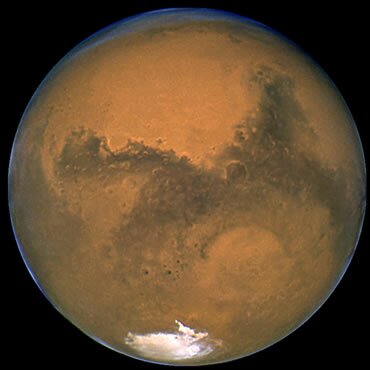Thu 28 Aug 2003

Hubble captured an image of Mars with a resolution of 27 kilometres thanks to the planet’s recent fly-by (Image: NASA)
(via NewScientist)
Will Knight, NewScientist.com news service, writes:
Hubble captured an image of Mars with a resolution of 27 kilometres thanks to the planet’s recent fly-by (Image: NASA)
To coincide with the closest encounter between Mars and Earth in 60,000 years, the Hubble Space Telescope has captured a spectacular new image of the Red Planet.
At 0932 GMT on Wednesday, Mars passed within 55,760,220 kilometres of the Earth - just 145 times the distance between the Earth and the Moon. The planets will not be so near again until 28 August, 2287.
Such close passes are both rare and irregularly timed because of a complex interaction of the planets’ orbits. Earth and Mars pass around the Sun on a similar plane of inclination but travel at different speeds.
Periodically, they coincide along a bearing from the Sun. But even then the distance between them can vary significantly, because the two planets have differently shaped elliptical orbits. When the planets were aligned in 1999, they were 87 million kilometres apart.
The Hubble image was taken 11 hours before the planets were at their closest, though the extra distance between them was just 2300 kilometres.
The image can resolve features on the surface of Mars measuring just 27 kilometres across. “These are the best that have ever been, and will ever be, taken by the Hubble Space Telescope,” says Michael Wolff of the Space Science Institute in Colorado, US.
Among the features revealed in the Hubble image is Sinus Meridiani, the location of many meteorite impacts and seen as a dark blotch to the left of the image. This is where Opportunity, one of NASA’s Mars Exploration Rovers, is scheduled to land in January 2004.